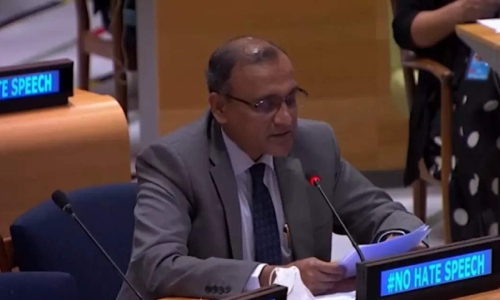There cannot be double standards on religiophobia: India at UN
Agencies | New Delhi
The Daily Tribune – www.newsofbahrain.com
There cannot be double standards on religiophobia and the exercise undertaken to combat it should apply equally to phobias against non-Abrahamic religions, India has said at the United Nations. Amid condemnation from more than a dozen Muslim-majority countries over the controversial remarks against Prophet Mohammed by now-suspended BJP functionaries, TS Tirumurti, India's Permanent Representative to UN, asserted that India does not need “selective outrage” from outsiders.
The Bharatiya Janata suspended its national spokesperson Nupur Sharma and expelled its Delhi media head Naveen Kumar Jindal after their derogatory remarks against the Prophet. While India moved swiftly to assuage the outrage in West Asia over the controversial remarks, it slammed the Organisation of Islamic Cooperation (OIC) for its statement that included the hijab row, “demolition of Muslims' properties and growing violence against them.”
“Aberrations are dealt with within our legal framework and we do not need selective outrage from outsiders, especially when they are self-serving - even communal in nature, and pursuing a divisive agenda,” Tirumurti said.
"As we have emphasised time and again, combating religiophobia should not be a selective exercise involving only one or two religions but should apply equally to phobias against non-Abrahamic religions as well. Till this is done, such international days will never achieve their objectives. There cannot be double standards on religiophobia,” the envoy added.
Tirumurti was speaking at the anniversary event of the International Day on Countering Hate Speech titled ‘Role of education to address the root causes of hate speech and advance inclusion, non-discrimination, and peace’. He asserted that India promotes tolerance and inclusion, and deals with any aberration within the legal framework.
“India’s multicultural edifice has, over centuries, made it a safe haven for all those who seek refuge in India, whether the Jewish community or Zoroastrians or Tibetans or from our own neighbourhood,” Tirumurti said.
“It is this underlying strength of our nation that has withstood radicalisation and terrorism over time,” he added.
Related Posts

